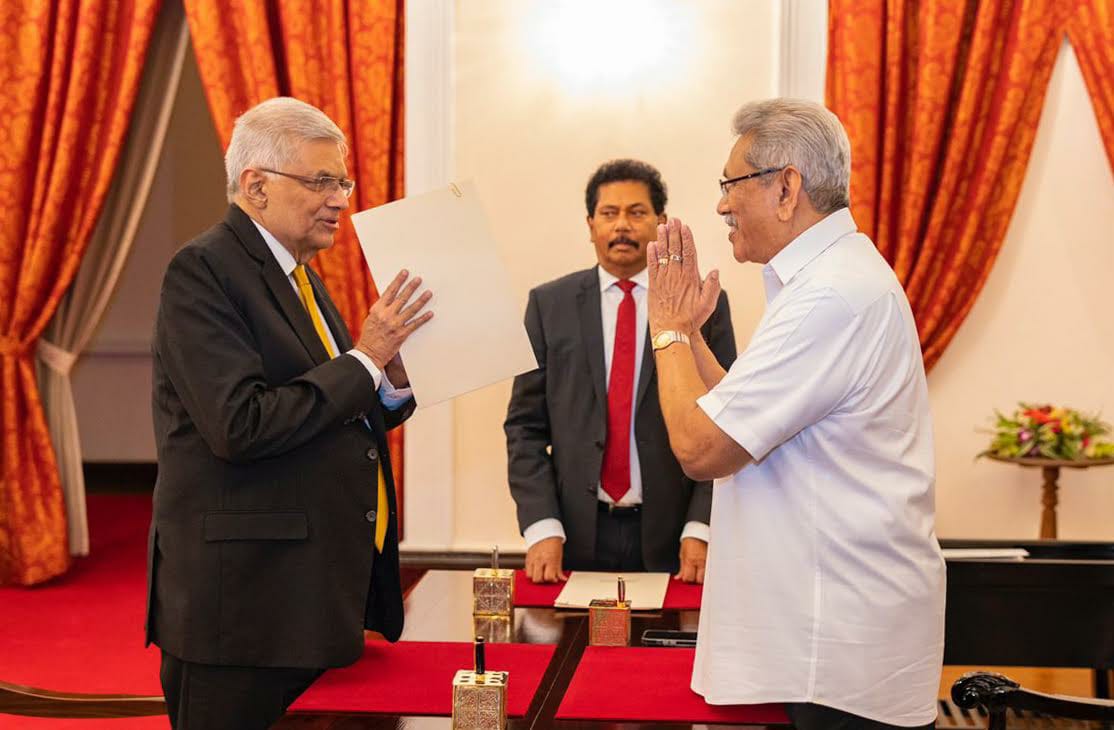Ranil Wickremesinghe has been sworn in as Sri Lanka's Prime Minister today before Sri Lanka's President, Gotabaya Rajapaksa.
Wickremesinghe has served as Prime Minister of Sri Lanka from 1993 to 1994, 2001 to 2004, 2015 to 2015, 2015 to 2018, and 2018 to 2019. With this announcement, Tamil Guardian takes a look back at the veteran United National Party (UNP) leader who has become Sri Lanka's Prime Minister for the 6th time with just one seat in Parliament.
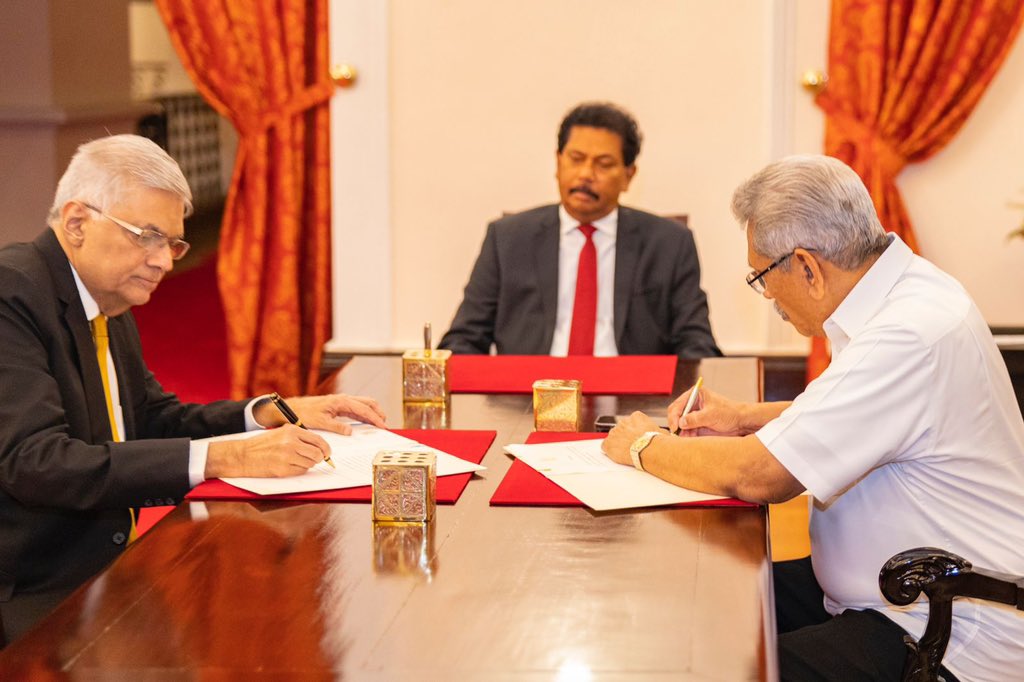
‘Probably dead’
For Tamils, Wickremesinghe’s callous remarks on the struggle to find answers to the whereabouts of the forcibly disappeared remain fresh.
In 2016, he triggered outrage amongst Tamils in the North-East, when he twice claimed that the thousands of Tamils that surrendered during the final phase of the armed conflict or were forcibly disappeared Tamils were “most probably dead”.
He offered no explanation as to who killed them or why they had died.
In 2019, he told Tamils to “forget the past and move forward” at an event in Kilinochchi.
His visits to the North-East have triggered protests from Tamils, including from families of the disappeared.

Read more below:
Missing and disappeared persons most likely dead says Sri Lanka prime minister
Sri Lankan PM faces backlash after telling Tamils to ‘forget the past’
The missing are considered dead says Sri Lankan prime minister
Mannar disappeared families protest Ranil visit
Police block families of disappeared protesting in front of Ranil
Keppapulavu residents protest Ranil's visit
Protest in Jaffna ahead of Sirisena-Ranil visit for Pongal
Armed security as Ranil eats ice cream in Jaffna
Defending the military and rejecting international accountability
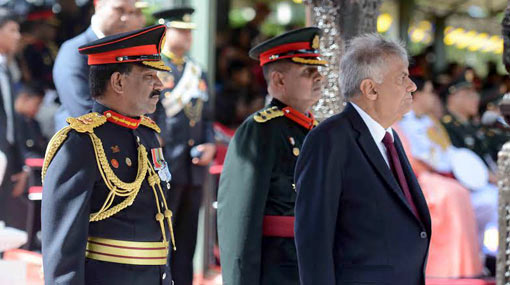
Wickremesinghe has also consistently stated his opposition to any international accountability mechanism for violations of international humanitarian law, even claiming that his government’s ability to postpone UN resolutions “saved Mahinda Rajapaksa from the electric chair”. He also claimed to have saved members of the government from being hauled before the International Criminal Court.
"We will never accept an international war crimes tribunal," he told Sri Lanka's parliament in 2016. "I never approved the Rome Statute. Sovereignty lies with the people according to our Constitution."
He would reiterate how it was throughout his tenure that Sri Lanka “refused to sign the Rome Statute which established the ICC” and how he "has no desire to send soldiers to any court".
Read more below:
‘We will never accept an international war crimes tribunal’ – Sri Lankan prime minister
‘I saved Rajapaksa from the electric chair’ claims Ranil
‘I saved Sri Lanka from ICC’ says Ranil Wickremesinghe
‘South will look after the Southerners’ says Ranil
Ranil says 'govt has no desire to send soldiers to any court'
‘Why all this fuss?’ asks Ranil Wickremasinghe
No foreign involvement in war crimes probe - Ranil
Ranil claims to have ‘preserved Sri Lanka’s sovereignty’ at United Nations
War criminals are Ranil’s ‘friends’
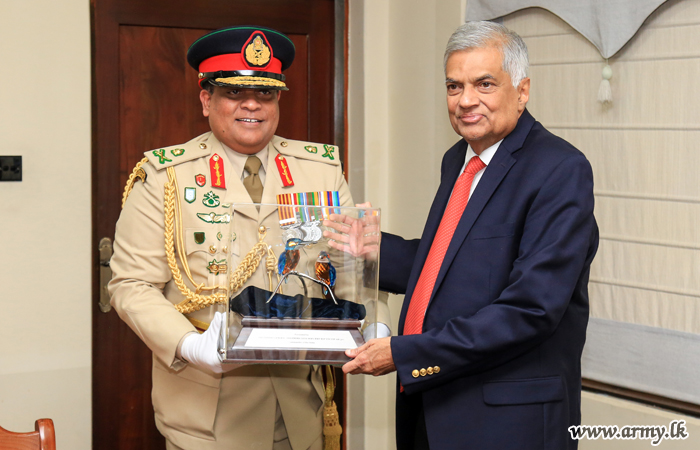
Alongside stating how he would “never betray the forces,” Wickremesinghe has close ties to those accused of mass atrocities.
Speaking on Shavendra Silva, the current head of the Sri Lankan army who is barred from entry to the USA due to his role in the execution of Tamils, Wickremesinghe said, “I have no problem with Shavendra Silva. He is my friend, and he has helped me a lot.”
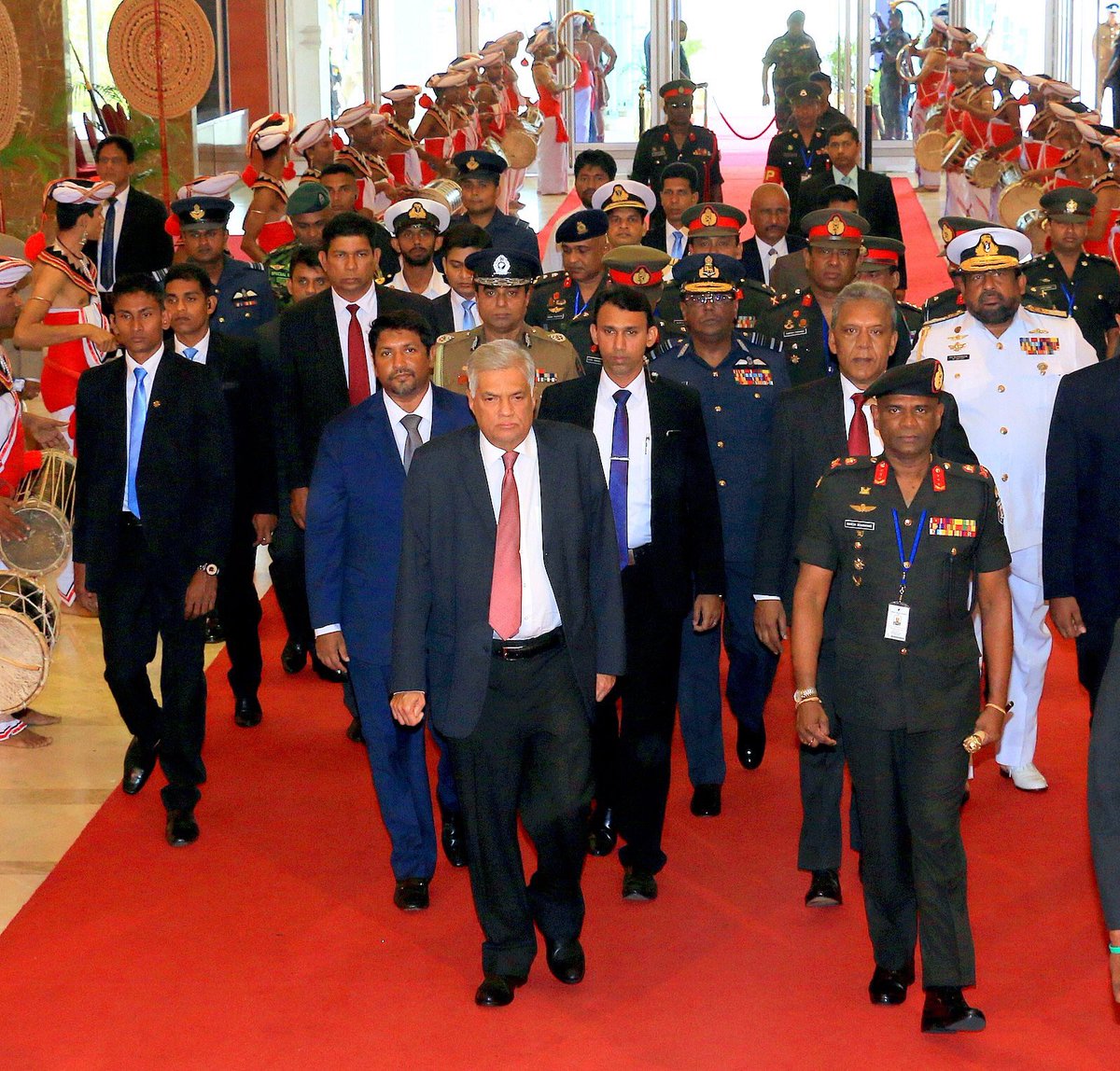
In 2018, Wickremesinghe appeared at a defence conference alongside Sri Lanka's chief of defence staff Admiral Ravindra Wijegunaratne, just a day after a Colombo court had ordered his arrest for allegedly helping the main suspect in the abduction and murder case of 11 Tamil youths evade arrest.
A staunch Sinhala Buddhist

During his most recent tenure, Wickremesinghe has consistently upheld the Sinhala Buddhist nature of the Sri Lankan state, pledging that any constitution for the island would ensure Buddhism continues to hold the “foremost” place and denying there would be any federal solution to the ethnic conflict.
Read more below:
New constitution drafted within 6th Amendment says Ranil
Ranil denies federal solution and pledges to uphold Buddhism in new constitution
Ranil assures monks of Buddhism's foremost place
Ranil claims to have ‘preserved Sri Lanka’s sovereignty’ at United Nations
Ranil pledges government will ‘do more work to protect Buddhism’
Responsibility of government to spread Buddhist message says Ranil
Easter Sunday attacks
![]()
Wickremesinghe has faced a wave of criticism following the Easter Sunday bombings. He admitted that the Government of India had alerted Sri Lanka’s Police intelligence service of the Easter Sunday attacks hours prior to the incident however the police failed to act.
He also admitted the government's "failure" to ensure security which could have prevented the Easter Sunday bombings which killed over 250 people across the island.
Speaking to Sky News, Ranil said there had been a "breakdown in government machinery" with intelligence not being passed on to himself and other ministers
"If we had known the information and we had not acted then I would certainly say the government had to be held responsible and [should] leave office."
However, in an interview with Channel 4, Wickremesinghe evaded his responsibility as prime minister in ensuring security, and laid the blame at the feet of the president.
Read more:
Former Sri Lankan Prime Minister admits India provided alert for Easter Sunday attacks
Ranil admits 'failure' of government to ensure security
The economics
Wickremesinghe has always been seen as leading the UNP towards a centre-right free market based economic policy. However, it is precisely that policy that brought him under fire from the Rajapaksas, who blamed his administration for beginning the current crisis.
When questioned if the previous administration bore the blame for the current crisis earlier this year, Wickremasinghe rejected this stating:
“No, it was not in the making at that time. We had problems from time to time, but an economic crisis was not in the making.
I don’t want to delve too much into the past. In 2015, We did have a problem in terms of debt repayment. But by 2017, we were able to build a surplus in the primary account for the first time after about 60 years. And we were building upon it. Then again, despite problems in 2019, the economy was doing fine. There was a setback, but we picked up in the six months that followed.
So, it wasn’t the period of time when the problems began. Problems began when the present government reduced the value-added tax (VAT). During our time, the budgetary position improved because we increased the VAT. By reducing the VAT, the government deprived the national coffers of the revenue that was required to maintain a surplus. S
econdly, Sri Lanka was quite unprepared for an external shock like the Covid-19 pandemic. Our economy should have been prepared for external shocks. We should have gone to the IMF and spoken with them to put the IMF facility back on track as we were finishing up the one we had been given at the time. We didn’t do that. The government just carried on. If we had spoken with the IMF, we wouldn’t have ended up here.”
A failed presidential run
In the 2005 Presidential election, Wickremesinghe faced Mahinda Rajapaksa at the polls. See extracts from our editorials before and after that election below.
Birds of a feather - 03 November 2005
Mr. Wickremesinghe has tried hard not to distance himself too far from Sinhala nationalism. Indeed, he has surreptitiously sought to court the right wing vote, publicly interacting with Sri Lanka’s powerful and hardline Buddhist clergy, and positing ‘defeating separatism’ as his primary stance on the ethnic question. He has even won over a prominent member of the hardline monks’ party – a small gain perhaps, but a telling one in the north. Most importantly, however, Mr. Wickremesinghe has failed to outline a clear, unambiguous position on the ethnic question. Whereas Mr. Rajapakse has rejected self-determination and the notion of a Tamil homeland, Mr. Wickremesinghe has simply avoided comment on these. This is not merely political prudence, as far as the Tamils are concerned, but one underpinned by a shared view.
In short, the Tamil view is that for the conflict to be resolved, the Sinhala leadership must break irreconcilably with the Mahavamsa mindset and the political dynamics of the past half century and approach the ethnic question from a bold new position: a multi-national, not merely a multi-ethnic, one. But neither Rajapakse, certainly, nor even Wickremesinghe is prepared to do this. Whilst the former bristles against a Tamil political identity, the latter is avoiding controversy by refusing to come clean. This is what makes them indistinguishable to the Tamils and underpins the apathy in the north.
A constant factor - 16 November 2005
In a particularly crude display of patriotism, Wickremesinghe, the darling of local and international liberals, is reported to have held a Lion flag aloft and vowed to unite the island under it. The pledge will no doubt be put to a practical test should he win.
But the irony of the Tamils being called on to boost the chances of a candidate whose lieutenants only last week were boasting about how their government trapped and split the Tamil struggle through the peace process is not lost on us.
True, Wickremesinghe may be better for some aspects of the peace process. But the catchall of ‘federalism’ demands close inspection and not merely blind faith. In this regard, as far as the Tamils are concerned, Wickremesinghe and Rajapakse have laid out the facts of the matter clearly over the past few weeks. Both are products of the same Sinhala-dominated political system. Both have now wrapped themselves in the Lion flag. And both are equally committed to denying a Tamil political identity and, thence, political rights. There is no real choice between them.
Falling Cards - 23 November 2005
The UNP and its leader must take the blame for his failure to bring the Tamils out in its favour. It may be easier – and certainly more comforting - to write off the Tamil boycott as a consequence of LTTE coercion, as many, including some members of the international community, have. But to assume that Tamils saw the ‘obvious’ benefit for peace of having Wickremesinghe as President is to misunderstand both Tamil sentiments and, we suggest, the man and his party. The UNP is gripped this week by internal post-poll wrangling: but the debate is not about the Tamils and the peace process, but how to recover the Sinhala heartland. Supports of the liberal peace in Sri Lanka undoubtedly would have preferred a Wickremesinghe win. But to fixate on the LTTE and any role it may or may not have had is to ignore the overarching dynamic: the Sinhalese have swarmed to support Rajapakse and his ultra-nationalist platform.
Before the elections Wickremsinghe did not utter a word on sharing tsunami aid with LTTE areas or setting up an interim administration for the Northeast – remember the ISGA? But these factors have simply been ignored amid misguided confidence that the hardline platform trod by Rajapakse and his allies, the ultra nationalist Janatha Vimukthi Perumana (JVP) and hardline monks party, the Jeyatha Hela Urumaya (JHU), would make Wickremesinghe the Tamils’ de facto choice. The UNP leader did absolutely nothing to build bridges with the Tamils.
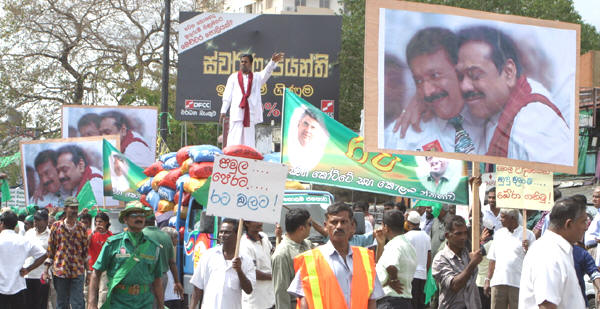
In 2007, just two years after losing the presidential election to Rajapaksa, the Wickremesinghe-led UNP held a rally, under the banner “The Great Betrayal of the Great Buddhist". Placards with manipulated photographs of LTTE leader V Prabhakaran and Rajapaksa embracing were displayed, claiming the Rajapaksas were "colluding with the Tigers". Amongst those present were Rajapaksa’s former foreign minister Mangala Samaraweera.
Devastating losses in 2020
![]()
Though Wickremesinghe would return to power in 2015, his tenure was short lived.
During the 2020 parliamentary elections, the UNP suffered humiliating losses, failing to win any districts and Wickremesinghe also losing his seat. The party secured just over 2% of the island's votes, losing more than 100 seats from the previous parliament.
Later today, however, that same man, may be appointed Sri Lanka’s next prime minister once more.
We need your support
Sri Lanka is one of the most dangerous places in the world to be a journalist. Tamil journalists are particularly at threat, with at least 41 media workers known to have been killed by the Sri Lankan state or its paramilitaries during and after the armed conflict.
Despite the risks, our team on the ground remain committed to providing detailed and accurate reporting of developments in the Tamil homeland, across the island and around the world, as well as providing expert analysis and insight from the Tamil point of view
We need your support in keeping our journalism going. Support our work today.
For more ways to donate visit https://donate.tamilguardian.com.

